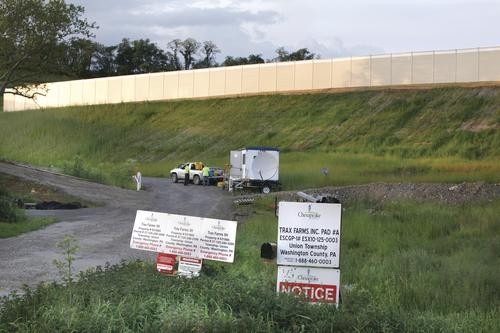
You can no longer see the 15-story drill rig that once stuck out from the rolling hills of Trax Farms. For the moment, Chesapeake Appalachia is between stages of drilling in the Marcellus Shale below the 300-acre family farm in Finleyville, Washington County. But in the next few months will come hydraulic fracturing, or "fracking," in which millions of gallons of water and chemicals are pumped underground, shattering rock and freeing the natural gas inside.
"It's an efficient source of energy that we feel we need to go after," says Ross Trax, the greenhouse manager at Trax Farms. What's more, he says, "it's another source of income."
Indeed, farms can receive hefty upfront bonuses for allowing drilling, and royalty payments for the gas extracted from beneath their land. But there are costs as well. Fracking is a controversial practice, with environmentalists voicing fears that the chemicals used for it can foul water supplies.
"There are groups currently working to boycott farmers that allow fracking," says Dana Dolney, an anti-drilling activist from Polish Hill. "This large-scale industrial practice is going on, and there's no study that [the chemicals] can't make it into the food chain."
Trax, which earns most of its farm revenue from an on-site market, hasn't incurred much negative publicity so far. While "most of our customers are for it," Trax says, anonymous commenters have posted on Facebook and other websites that they will stop buying from the farm. Since the drilling started, Trax family spokeswoman Terry McLaughlin says, about two dozen customers have walked out the door after seeing the rig. Fewer than 50 have sent email complaints about the drilling.
McLaughlin hopes customers will remain understanding. "We hate to think that something we did to help us, to help the community, could come back and hurt us," she says.
Whatever such disputes may say about gas drilling, they reveal a hard truth about agriculture: It doesn't always pay.
"It's pretty well documented how conventional farms struggle. They produce crops at below costs of production," says Brian Snyder, executive director of the Pennsylvania Association of Sustainable Agriculture (PASA).
For such farms, a check from the gas company can make a sizable difference in the profitability and viability of a farm's operation, says Mark O'Neill, a spokesman for the Pennsylvania Farm Bureau.
Contracts and royalty agreements vary depending on whether the landowner holds the mineral rights. Patrick Creighton, a spokesman for industry-group Marcellus Shale Coalition, says initial payments can vary from less than $100 per acre drilled to more than $5,000 per acre. Royalties can range from between 12.5 percent and 20 percent of the value of gas taken out.
Gas companies like Range Resources have seized on the idea that they are helping to rescue local farms. In one Range TV spot, a Washington County couple who farm livestock part time praise the firm's role.
"Range Resources' participation in the community has benefited local farmers," says the man, seated at his dinner table with his wife. "Equipment has been updated, buildings have been updated, the lifestyle has changed somewhat for these farms, and that's a great thing."
But when wells produce, it can pit farmers who have gas under their land against their neighbors, Snyder says. "There's a natural inclination for those who won't have drilling on their land to resent those that do. This is really going on in the rural community. Some people benefit, some people aren't -- but are having to deal with the expense and mess of it."
Even some farmers believe that drilling isn't worth it. Among their concerns, says Jefferson County farmer and anti-drilling activist Stephen Cleghorn, are that airborne pollutants from drilling operations can settle on pastures, or be breathed in by livestock.
Others who have allowed drilling say they've come to regret it. Since gas companies first drilled on Ron Gulla's 141-acre Washington County farm in 2002, "They've ruined more aquifers [from which groundwater can be extracted] than you can shake a stick at." Gulla, whom City Paper first wrote about in 2009, blames gas wells for befouling the water his livestock once drank from. And he says other landowners should be careful about what the gas drillers promise.
"If you believe everything they're telling you," he says, "you've got to be nuts."
Other than such anecdotal accounts, there's been very little research on the effects of gas drilling on agriculture.
"As most everyone will admit, we don't have enough information on the impacts of gas drilling as a whole yet," says Adam Garber, a field director at PennEnvironment, a state-wide environmental advocacy group. "But every day, we hear a new story."
The DEP does not have specific regulations for drilling in agricultural areas. Nor could it provide a breakdown of how many wells have been permitted on farmlands. But the agency says consumers shouldn't be concerned about meats or produce that come from farms that allow drilling. If an incident did occur that led to contamination, DEP spokesperson Jamie Legenos says in an email, the agency would quarantine any livestock or crop for testing.
Further, Legenos says, if drilling is done in an "appropriate and safe manner there isn't any risk."
What's more, says Creighton, the industry spokesman, "[The industry] has every incentive to get this right. Too much is at stake to get it wrong. They drink the same water, they breathe the same air as their neighbors."
But there have been some high-profile claims about the damage drilling can do. Garber and Dolney cite a report out of Tioga County, where cattle were quarantined after they drank from a wastewater pond at a well site. And the film Gasland, a documentary by Eastern Pennsylvania native Josh Fox, raised concerns with footage that featured, among other things, homeowners holding lighters beneath kitchen faucets, where they erupted into flame due to methane content.
Industry execs say the footage is misleading, in that methane has been known to leak into local water tables years before drilling began. But "regardless of if drilling does contaminate farms, there's a perception of that risk as more and more people are interested in the quality and origin of their food," says Samantha Malone, a communications specialist and doctoral student at the University of Pittsburgh's Center for Healthy Environments and Communities. "We know there is a potential for contamination, we just don't know to what extent."
That's why environmentalists support a "precautionary" approach to drilling -- one that insists on solid proof that drilling is safe before allowing it to continue.
Dan Bain, an assistant professor of geology and planetary science at Pitt, says one worrisome sign is that metals like bromide are being found at increasingly concentrated levels in local rivers.
"You can't say 100 percent it's from fracking," Bain says. But "It strongly coincides with the introduction of fracking," he says. "Anecdotally ... we know there are high concentrations in the water. What we don't know is how the fracking waters interact with drinking water or the food-supply water. That's the greatest uncertainty."
Adds Dolney: "Once someone's water has been fouled, you've lost everything."
Farmers have special reason to worry. And even when drillers tap the gas, it isn't always a golden ticket.
According to state records, Atlas Energy started pumping gas on Lone Oak Farms -- one of the largest farms for Turner Dairy -- in Westmoreland County last year. But Lone Oak owner Chuck Carr says the well shut down after just a few months. It's produced 23 million cubic feet, he says -- a volume that pales in comparison to the billion or more cubic feet produced by wells elsewhere. In any case, he didn't see any royalties: He doesn't own the rights to the gas under his land.
"All of these stories of people getting rich -- I think they're just stories," Carr says.















